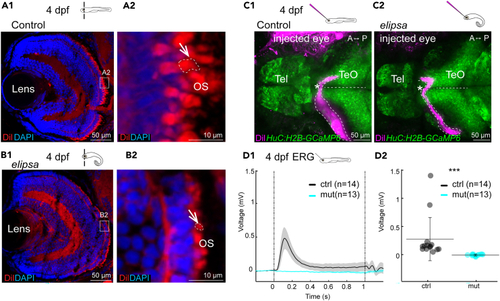Figure 5
- ID
- ZDB-FIG-240613-46
- Publication
- D'Gama et al., 2024 - Ciliogenesis defects after neurulation impact brain development and neuronal activity in larval zebrafish
- Other Figures
- All Figure Page
- Back to All Figure Page
|
(A1–B2) DiI staining of 4 dpf retina cryosection to stain the outer segments. Section through the whole retina or the photoreceptor layer of a representative control (A1-A2) and (D1-D2) Electroretinography (ERG) recordings in a 4 dpf retina. D1 Average response of electrical activity (+/− standard error of the mean as the shaded region) to 1 s light stimulation for control (black) and mutant (cyan). D2 Average electrical responses for the 200 msec following the light ON stimulus for all control fish (black) and |
| Gene: | |
|---|---|
| Fish: | |
| Anatomical Terms: | |
| Stage: | Day 4 |
| Fish: | |
|---|---|
| Condition: | |
| Observed In: | |
| Stage: | Day 4 |

